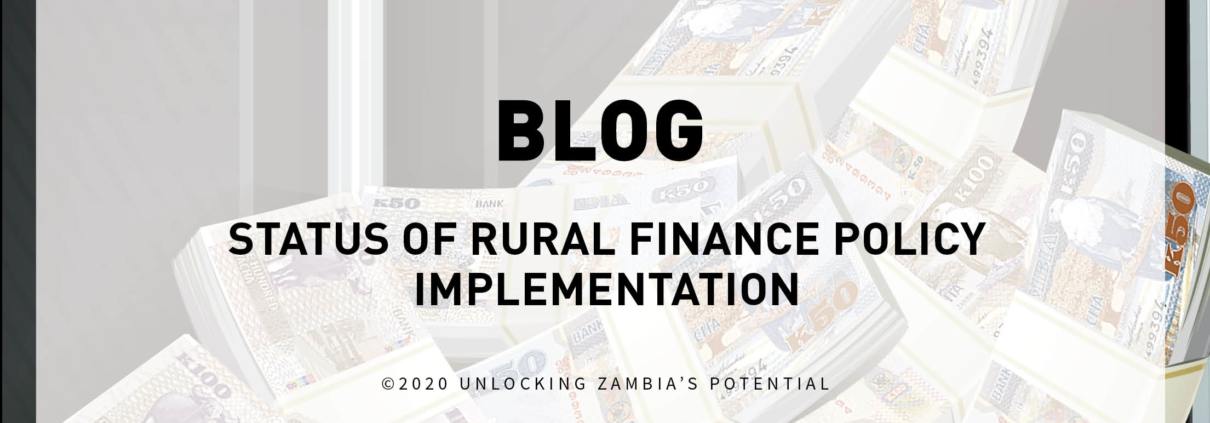Approximately 50% of adults in rural areas are unbanked or have no access to financial services (Finscope Report 2015). Access to financial services has been a challenge due to various reasons, which among others include low population density in rural areas and extremely poor infrastructure, compounded by low productivity, making it difficult and expensive to provide such services. The importance of increasing access to financial services cannot be overemphasized because of the key role it plays in reducing poverty, increasing employment and attracting development. This can consequently help to bridge the rural-urban economic divide; with 77% poor people in rural areas compared to only 23% urban areas (Living Conditions Monitoring Survey,2015).
To this effect, the Zambian Government developed the Rural Finance Policy and Strategy of 2012, a key policy document aimed at promoting access to financial services in rural areas and thereby reducing vulnerability and promoting the prosperity of the rural population. Some of the interventions/strategies that have been implemented by the Government as stated in the Rural Finance Policy and Strategy to promote access to financial services include the following among others:
Enactment of the Credit Reporting Act in 2018 to provide for the establishment of a Credit Registry and the overall governance and management of credit reporting agencies including the protection of data subjects as well as information sharing and reporting, to enable assessment of the creditworthiness of data subjects.
Support efforts to enable interoperability of the national payment switch to reduce the cost of financial services and modernize payment systems. The interoperability of payment systems was effected in 2019 and it is hoped that this will effectively facilitate better access to financial services for the unbanked in rural areas by reducing costs of financial services and modernization of payment systems.
Revision of the National Payment Systems Directives on Electronic Money Issuance. In 2018, the Bank of Zambia revised the National Payment Systems Directives on Electronic Money Issuance that were initially issued in 2015. The key changes to the directives included the following:
Permitting customers to hold multiple wallets.
Permitting both commercial banks and approved non-bank financial institutions to host Holding Accounts for electronic money.
Inclusion of specific guidance on the use of interest earned on Holding Accounts.
Provisions for consumer protection and the need for e-money institutions to have procedures for dealing with customer complaints.
Consequently, the volume of transactions processed on mobile money platforms in 2018 rose by 76.0% compared to 2017.
Support towards the implementation of microinsurance products in the agriculture sector; In 2017, Government awarded Mayfair Insurance Company a contract to offer weather-based index insurance to all farmers who benefited from Government input subsidies through Farmer Input Supply Programme (FISP).
In September 2018, Government established the Rural Finance Unit to coordinate rural finance, under the Department of Investment and Debt Management at the Ministry of Finance (MoF).
In 2016, the Government enacted the Movable Property Security Interest Act (MPSI) to Support efforts to fully establish unified collateral registry, including the use of movable property. The Act is aimed at making the business environment attractive for lenders to accept movable property as collateral. The MPSI Act seeks to make movable property a reliable form of collateral, thereby diversifying the nature of mobile assets used as collateral resulting in enhanced borrowing.
he Bank of Zambia has also been at the fore of promoting the Financial Literacy Week aimed at empowering people with knowledge on available financial products and services as well as creating momentum on both the supply and demand-side information for the development of consumer-centric financial products and services.
RECOMMENDATIONS
In order to further upscale financial inclusion in rural areas specifically and the entire country generally, the following issues need to be addressed:
The Central Bank of Zambia needs to urgently develop Agency Banking Regulations to guide and accelerate agency banking in underserved rural areas and consequently increase the agency banking’s share of transaction volume by financial agents.
The Development Bank of Zambia needs to play an active role as an apex financial institution providing finances to micro-financial institutions for onward lending to rural areas as espoused in the Rural Finance Policy and Strategy and Rural Finance Expansion Programme (RUFEP) programme design.
Government and Zambia Agriculture Commodity Exchange (ZAMACE) needs to put in place measures that will guarantee smallholder farmers’ active participating in the agriculture commodity exchange as opposed to the current scenario where the majority of farmers having access to the agriculture commodity exchange are well-established farmers.
The Pensions and Insurance Authority (PIA) needs to upscale its efforts in ensuring that the necessary microinsurance guidelines/principles are promptly put in place to promote the growth of insurance uptake in rural areas and the country at large. Additionally, legislation (Insurance Act) needs to be amended to accommodate licensing of micro-insurers and facilitate the opening up of the distribution space.
Following the enactment of Movable Property Security Interest (MPSI) Act in 2016, Patents and Companies Registration Agency (PACRA) and other stakeholders need to increase sensitization in rural communities on the new options available to smallholder farmers through MPSI Act regarding use of movable assets as collateral to access finance.
The Zambia Statistics Agency needs to include “financial inclusion variables” in its routine national surveys to be able to measure financial inclusion statistics as opposed to the country relying on private sector sanctioned surveys to measure financial inclusion.
The Ministry of Agriculture needs to decisively deal with complaints specifically relating to inconsistences in Weather Insurance Index payouts where some farmers receive payouts while others do not, yet they are residing in the same geographical area affected by the drought. Enhanced confidence in Weather Insurance Index will enhance the uptake of other micro-insurance products by farmers.
Some of the key activities during the Financial Literacy Week need to be extended to the rest of the year and priority should be given to rural areas with lower levels of financial inclusion.




